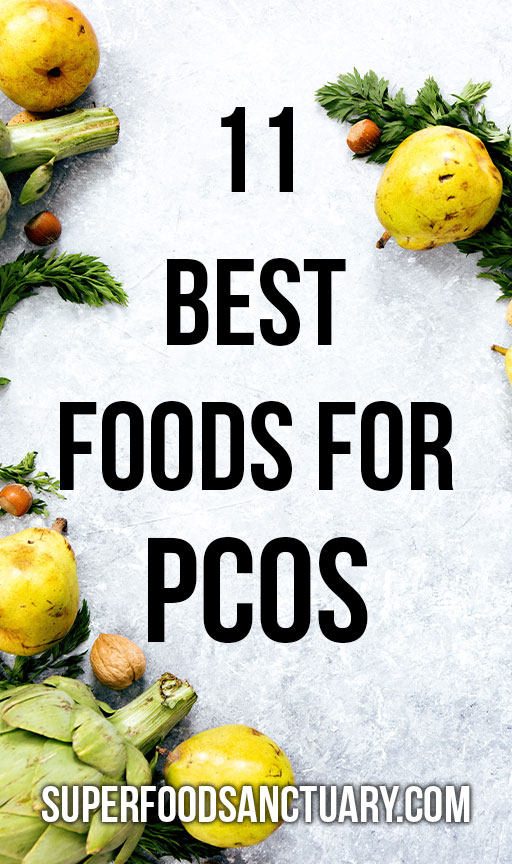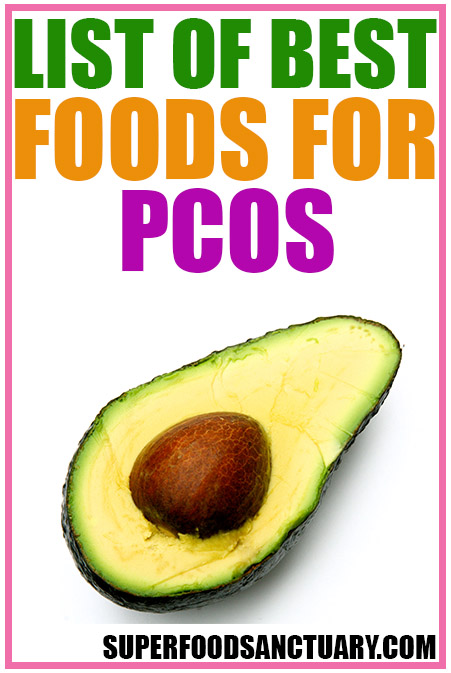If you have been diagnosed with PCOS, it’s just natural that you upgrade your diet. Here are the best foods for PCOS to include in your PCOS diet!
Eating for PCOS can be frustrating especially if you are dealing with insulin resistance, diabetes, infertility or heavy painful periods.
Almost all healthy diets out there say avoid processed foods with refined sugar, refined flour, factory milk, artificial colors & flavors and processed meats. [Must Read: Top 7 Worst Foods to Avoid if you Have PCOS]
However, with PCOS, there’s a more specific diet you need to follow. For example, you can’t eat a lot of fresh fruits – most fruits are high in sugar so you have to eat them in moderation with PCOS. There are many such food rules to follow and this article will take you through them:
List of 11 Best Foods for PCOS

1. Eggs
Eggs are awesome as a PCOS breakfast food. They are a complete protein, contain healthy fats and nutrients such as Vitamin A, B-Vitamins, Vitamin D and more. They have a low Glycemic Index (GI).
Eggs are also a great food for fertility. Eating eggs for PCOS promotes healthy ovulation, which helps regulate your menstrual cycle.
2. Legumes
Legumes include beans, chickpeas, peas and lentils. They are high in protein, contain low-fat and are rich in fiber. You can find essential nutrients such as potassium, iron, calcium, folate and magnesium in legumes.
3. Berries & Certain Fruits
Eating fruits in moderation is key for PCOS sufferers because fruits contain fructose, a sugar that can raise glucose levels in blood.
The trick is to stick to fruits that contain a low glycemic index such as cherries, apples and kiwi.
Berries such as blueberries, raspberries, blackberries, strawberries, currants, and cranberries are rich in antioxidants. These antioxidants include polyphenols, flavonoids, and other phytocomponents that boost immunity, fight inflammation and prevent obesity.
Also include fruits known as ‘stone fruits’ because they contain a pit/seed/stone inside them. These include apricots, peaches, plums, nectarines. They contain anti-inflammatory, anti-obesity and anti-diabetic properties. [Must Read: 5 Best Fruits for PCOS Patients]
Remember to balance your fruit intake with a handful of nuts or seeds to regulate blood sugar. So you can have berries with gluten-free pancakes made of flaxmeal & eggs, eat a handful of berries with nuts, etc.

4. Colorful Vegetables
On a PCOS diet, you can eat all vegetables without any problems, except potatoes, which you want to consume in moderation.
Have you ever heard the saying ‘eat the rainbow?’ It means load up your plate with colorful vegetables and fruits. Naturally colored, that is. Colorful vibrant veggies are rich in antioxidants that protect your body and strengthen the immune system.
Add vegetables like capsicum, beets, tomatoes, broccoli, bell peppers, carrots, artichokes, asparagus, sweet potatoes, pumpkin, tomatoes and more to your daily diet. You can have them fresh, steamed, boiled, sautéed, baked, roasted and more.
5. Non-Dairy Milk
It’s best to avoid dairy in a PCOS diet. What you can substitute them with are plant-based milks such as nut milks. You can use coconut milk, almond milk, oat milk, and others! Personally, almond milk and coconut milk are the top two non-dairy milks for PCOS.
Use them in making smoothies, milkshakes or making hot cocoa!
6. Dark Leafy Greens
Dark leafy greens include spinach, kale, arugula, romaine lettuce, dandelion greens, chard, collard greens, red leaf lettuce, parsley and more.
They have low calories & low GI, are rich in fiber and are jam-packed with antioxidants, phytochemicals and essential vitamins and minerals!
Some of the beneficial nutrients in leafy greens are Vitamin A, B-vitamins, Vitamin C, Vitamin D, Vitamin E, Vitamin K, iron, zinc, calcium, magnesium, potassium and manganese.
When eating dark leafy greens, pair them with essential fatty acids and acid such as citrus acid, acetic acid, etc. For example, you can sauté your leafy greens in olive oil and eat them in a salad with vinegar (rich in acetic acid!). Healthy fats and acids help increase the bioavailability of the fat soluble nutrients in leafy greens.

7. Nuts and Seeds
Nuts and seeds are protein-packed foods that are PCOS-friendly. Examples of nuts you can eat include almonds, peanuts, cashews, walnuts, macadamia nuts and brazil nuts.
Seeds you can munch on a PCOS-friendly diet include pumpkin seeds, chia seeds, flax seeds, hemp seeds and others.
Eat nuts and seeds in combination with fruit or other high glycemic foods. This helps lower the glycemic index and improves glucose-insulin levels.
Nuts and seeds also contain essential fatty acids (EFAs) that are very useful for managing PCOS symptoms. They help regulate hormones, lower insulin levels, stabilize blood sugars, improve hair, skin & nails as well as improve fertility!
8. Wild Caught Fish
Wild caught fish such as salmon, mackerel, sardine and tuna are rich in omega 3 fatty acids. Omega 3s are important for fighting off inflammation in the bodies. They also help balance hormones that have gone out of whack.
9. Herbal Teas
Replacing your morning coffee with herbal teas is life-changing if you have PCOS. You can take green tea, chamomile tea, black tea or rooibos tea.
Green tea in particular, contains powerful antioxidants and polyphenols that promote great health. Unsweetened green tea also has zero calories. Drinking more than 2 cups daily can help fight off oxidative stress in the body. [Must Read: Top 5 Herbal Teas for PCOS]

10. Superfoods
Superfoods are magical! They are LOADED with antioxidants that nourish your body to the max! Superfoods for PCOS help balance hormones, beautify your skin, promote hair growth, heal acne, promote detoxification and help manage unwanted weight gain.
Some of the best superfoods for PCOS are maca, cacao, chia seeds, goji berries, acai berry and more. Read: My Top 10 Best Superfoods for PCOS
11. Millets & Quinoa
When you have PCOS, you might want to cut down on consumption of grains such as rice, wheat, barley and more because of their high glycemic index. Processed foods such as refined white flour can disrupt hormones, worsening PCOS symptoms.
Instead, opt for whole gluten-free grains such as brown rice, oatmeal, millets, quinoa and amaranth.



Other PCOS Info You Must Know
- How to Use Turmeric for PCOS
- 3 Fertility Smoothies for PCOS
- 3 Juicing Recipes for PCOS
- Top 10 Superfoods for PCOS
- What to Eat for Breakfast when you Have PCOS
- 20 Effective Natural Remedies for PCOS
- Can Apple Cider Vinegar Treat PCOS?
- How to Treat PCOS Acne Naturally
- 5 Best Fruits for PCOS Patients
- 7 Worst Foods to Avoid if you Have PCOS
- Top 5 Herbal Teas for PCOS
- 5 Best Supplements for PCOS Fertility
- Can Black Seed Oil Help PCOS?
Leave a Reply